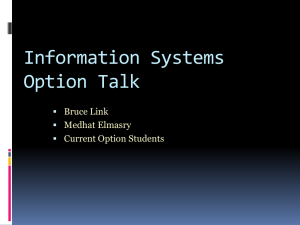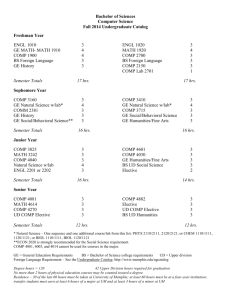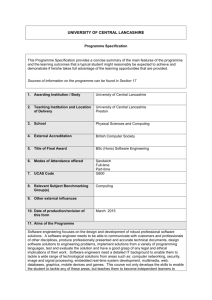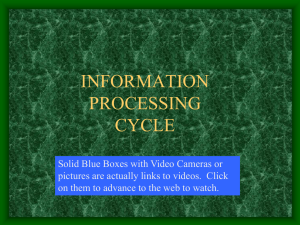BSc Hons Music Business and Creative Industries (July 2015)
advertisement
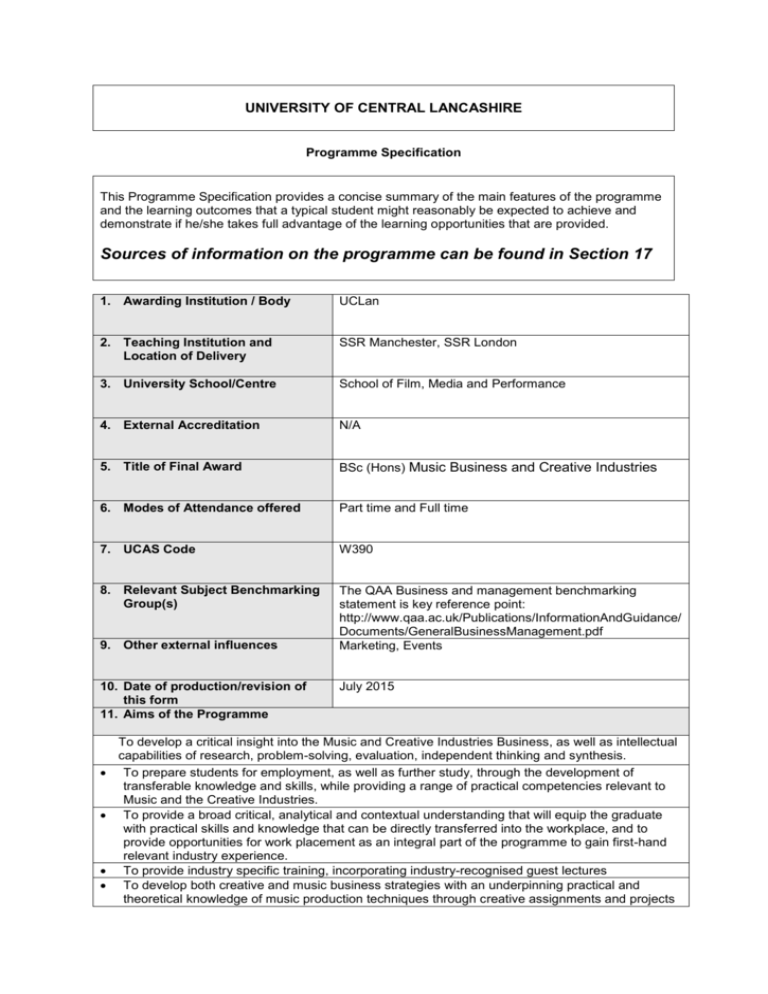
UNIVERSITY OF CENTRAL LANCASHIRE Programme Specification This Programme Specification provides a concise summary of the main features of the programme and the learning outcomes that a typical student might reasonably be expected to achieve and demonstrate if he/she takes full advantage of the learning opportunities that are provided. Sources of information on the programme can be found in Section 17 1. Awarding Institution / Body UCLan 2. Teaching Institution and Location of Delivery SSR Manchester, SSR London 3. University School/Centre School of Film, Media and Performance 4. External Accreditation N/A 5. Title of Final Award BSc (Hons) Music Business and Creative Industries 6. Modes of Attendance offered Part time and Full time 7. UCAS Code W390 8. Relevant Subject Benchmarking Group(s) The QAA Business and management benchmarking statement is key reference point: http://www.qaa.ac.uk/Publications/InformationAndGuidance/ Documents/GeneralBusinessManagement.pdf Marketing, Events 9. Other external influences 10. Date of production/revision of this form 11. Aims of the Programme July 2015 To develop a critical insight into the Music and Creative Industries Business, as well as intellectual capabilities of research, problem-solving, evaluation, independent thinking and synthesis. To prepare students for employment, as well as further study, through the development of transferable knowledge and skills, while providing a range of practical competencies relevant to Music and the Creative Industries. To provide a broad critical, analytical and contextual understanding that will equip the graduate with practical skills and knowledge that can be directly transferred into the workplace, and to provide opportunities for work placement as an integral part of the programme to gain first-hand relevant industry experience. To provide industry specific training, incorporating industry-recognised guest lectures To develop both creative and music business strategies with an underpinning practical and theoretical knowledge of music production techniques through creative assignments and projects 12. Learning Outcomes, Teaching, Learning and Assessment Methods A. Knowledge and Understanding A1. A2. A3. A4. A5. A6. A7. A8. A9. A10. A11. A12. A13. A14. Explain how music, digital and creative businesses work and interact together to form a successful industry Discuss relevant concepts and ideas obtained from a variety of academic, industry and webbased sources Identify and discuss efficiency of roles within a team Demonstrate a fundamental knowledge and understanding of marketing concepts Identify and discuss models, concepts, and tools of marketing Summarise the history, development and creation of music from a musicological perspective Discuss how historical, social and technological factors have influenced the development and creation of music Discuss the importance of IPR and Music law in the music, creative and digital industries Identify and justify brand and synchronisation opportunities for a business Identify and assess procedures for an efficient and safe approach to operating in the live events environment Discuss and appraise current business practices Investigate and evaluate working practices in a real working environment Identify an appropriate topic area that builds upon previous experience and knowledge gained on the course, and define and justify the nature, scope, structure and relevance of the topic Integrate knowledge gained in a range of areas (e.g. social, legal, commercial, creative aspects) Teaching and Learning Methods A blended learning approach is used – this comprises face-to-face practical/theory workshops and online learning, with the majority of sessions being practical face-to-face sessions. You will attend workshop sessions, and small group and individual tutorial sessions. In addition, students will use an online learning support. Teaching and learning strategies are varied, and include practical workshops, discussions, research, and practical project work. There is a strong element of workbased learning and students will be expected to make a contribution to the place of work, which might include a project to improve productivity. Students will have the opportunity to network at music industry conferences and also to build business relationships with industry ‘guru’ people who come into the classroom on a regular basis throughout the three years. Assessment methods Assessment items are designated as: practical, presentation, and coursework. The work presented for assessment is varied and could include: • reflective activities where experiences are analysed and evaluated • oral and written reports; • journals and log books; • plans (e.g., action plans, plans for your group activities); • presentations; • employer verification statements which verify that you have negotiated, agreed and conducted work-based activities • portfolios of evidence. • Live events B. Subject-specific skills B1. B2. B3. B4. B5. Identify and assess the structures of the media, creative and digital industries Effectively pitch ideas to potential stakeholders or partners Apply basic marketing concepts to a range of problems and situations Work collaboratively and independently in the execution of a project Employ effective techniques in project planning related to brand awareness B6. B7. B8. B9. B10. B11. B12. B13. B14. B15. B16. Apply knowledge of the financial, legal, marketing, and contractual issues, and stakeholder expectations, in planning a live event Plan, organise and manage a live event Analyse management or business issues and offer recommendations for improvement Implement effective management skills and techniques Design and evaluate solutions to resolve technical, creative and personal issues Manage and administrate a project to an appropriate level for the area of study Make and justify decisions for successful business planning Prepare effective financial projections Demonstrate appropriate competencies and skills required for the successful completion of work-related tasks and project activities Produce a portfolio of work which demonstrates an understanding of the specialist field of study Investigate work placement opportunities and propose strategies for securing a placement within a chosen field Teaching and Learning Methods A blended learning approach is used – this comprises face-to-face practical/theory workshops and online learning, with the majority of sessions being practical face-to-face sessions. You will attend workshop sessions, and small group and individual tutorial sessions. In addition, students will use an online learning support. Teaching and learning strategies are varied, and include practical workshops, discussions, research, and practical project work. There is a strong element of workbased learning and students will be expected to make a contribution to the place of work, which might include a project to improve productivity. Students will have the opportunity to network at music industry conferences and also to build business relationships with industry ‘guru’ people who come into the classroom on a regular basis throughout the three years. Assessment methods Assessment items are designated as: practical, presentation, and coursework. The work presented for assessment is varied and could include: • reflective activities where experiences are analysed and evaluated • oral and written reports; • journals and log books; • plans (e.g., action plans, plans for your group activities); • presentations; • employer verification statements which verify that you have negotiated, agreed and conducted work-based activities • portfolios of evidence. • Live events C. Thinking Skills C1. C2. C3. C4. C5. C6. C7. C8. C9. C10. C11. C12. C13. C14. Interpret a client brief, and deliver to deadlines Plan an event within a group, and reflect upon individual contribution Assess marketing strategies and their integration with other functional disciplines Analyse different aspects of musicology within the context of era Appraise IPR principles and practices relevant to the music, creative and digital industries Examine and assess the current and future impact of IPR on practices within music, creative and digital industries Evaluate personal performance and the outcome of the project Propose a project and argue for its feasibility Justify decisions and evaluate the outcome of the project Analyse and evaluate personal development needs Analyse and evaluate your role and personal development throughout the project Critically evaluate company structures and business start-ups Analyse and evaluate personal performance and the final project output Evaluate personal performance during a period of work placement Teaching and Learning Methods A blended learning approach is used – this comprises face-to-face practical/theory workshops and online learning, with the majority of sessions being practical face-to-face sessions. You will attend workshop sessions, and small group and individual tutorial sessions. In addition, students will use an online learning support. Teaching and learning strategies are varied, and include practical workshops, discussions, research, and practical project work. There is a strong element of workbased learning and students will be expected to make a contribution to the place of work, which might include a project to improve productivity. Students will have the opportunity to network at music industry conferences and also to build business relationships with industry ‘guru’ people who come into the classroom on a regular basis throughout the three years. Assessment methods Assessment items are designated as: practical, presentation, and coursework. The work presented for assessment is varied and could include: • reflective activities where experiences are analysed and evaluated • oral and written reports; • journals and log books; • plans (e.g., action plans, plans for your group activities); • presentations; • employer verification statements which verify that you have negotiated, agreed and conducted work-based activities • portfolios of evidence. • Live events D. Other skills relevant to employability and personal development D1. Present information effectively using ICT D2. Apply appropriate research techniques and employ academic conventions D3. Assess personal skills and develop short/medium and long term aims for self-management D4. Communicate ideas effectively in a range of methods D5. Communicate effectively with artists and other professionals D6. Work collaboratively with others while planning a project D7. Undertake a period of work placement D8. Work collaboratively with an employer to define and manage a project D9. Critically evaluate personal experience and performance, and identify points of personal development D10. Articulate arguments to an appropriate standard for the level of study D11. Provide Evidence of troubleshooting Skills Teaching and Learning Methods A blended learning approach is used – this comprises face-to-face practical/theory workshops and online learning, with the majority of sessions being practical face-to-face sessions. You will attend workshop sessions, and small group and individual tutorial sessions. In addition, students will use an online learning support. Teaching and learning strategies are varied, and include practical workshops, discussions, research, and practical project work. There is a strong element of workbased learning and students will be expected to make a contribution to the place of work, which might include a project to improve productivity. Students will have the opportunity to network at music industry conferences and also to build business relationships with industry ‘guru’ people who come into the classroom on a regular basis throughout the three years. Assessment methods Assessment items are designated as: practical, presentation, and coursework. The work presented for assessment is varied and could include: • reflective activities where experiences are analysed and evaluated • oral and written reports; • journals and log books; • plans (e.g., action plans, plans for your group activities); • presentations; • employer verification statements which verify that you have negotiated, agreed and conducted work-based activities • portfolios of evidence. • Live events 13. Programme Structures* Level Level 6 Module Code RP3201 RP3202 RP3203 RP3204 Level 5 RP2201 RP2202 RP2203 RP2204 RP2205 RP2206 RP1201 RP1202 RP1203 RP1204 Module Title People and Project Management Self-Employment in Music and Creative Industries Advanced Work Based Learning Major Project IPR and Legal Issues Synchronisation and Branding Live Events Entrepreneurial Skills Preparation for Industry Work Work Based Learning Level Music, Digital & Creative Industries 4 Study Skills & Professional Dev. Group Project and Pitching Marketing for the Music & Creative Industries RP1205 Introduction to Musicology 15. Personal Development Planning 14. Awards and Credits* Credit rating Bachelor Honours Degree 40 20 Requires 360 credits including a minimum of 120 at Level 5 or 20 above and 120 at Level 6 Bachelor Degree 40 Requires 320 credits including a minimum of 120 at Level 5 or above and 80 at Level 6 20 20 20 20 20 20 40 20 20 20 Diploma of Higher Education Requires 240 credits including a minimum of 120 at Level 5 or above Certificate of Higher Education Requires 120 credits at Level 4 or above 20 Personal Development Planning (PDP) is a key aspect of all courses at SSR. PDP is integrated within all modules and across the totality of study. PDP, through the creation of a personal document referred to as a Progress File, helps to define and focus educational and professional aims and goals; it will assist the student in considering how to engage with the learning opportunities the course offers to achieve personal career and professional objectives. This course consists of modules with fixed syllabi that together enable students to gain the knowledge and develop the skills essential to be a successful practitioner. However the course is designed to allow students to choose or negotiate many aspects of their learning in ways which are appropriate to their abilities, learning preferences and vocational intentions. This is referred to as a student-centred learning approach. When coupled with the self-monitoring and evaluation of PDP, study shifts from a tutor-led/teaching activity to a personally-defined learning experience. This is close to the way many professional artists operate and the terms ‘reflective practitioners’ or ‘thinking artist’ describe the kind of graduate we expect students to become 16. Admissions criteria Programme Specifications include minimum entry requirements, including academic qualifications, together with appropriate experience and skills required for entry to study. These criteria may be expressed as a range rather than a specific grade. Amendments to entry requirements may have been made after these documents were published and you should consult the University’s website for the most up to date information. Students will be informed of their personal minimum entry criteria in their offer letter. UK Applicants: Except in exceptional circumstances, UK applicants must attend an interview. Once your application has been processed you will be sent a letter stating the date you that you are required to attend, and what will be required of you. If it is not possible for you to attend on the date proposed, please contact us to rearrange a date or agree alternative arrangements. All successful candidates must have achieved the following: A minimum of 240 UCAS tariff points at A2 or equivalent Grade C in GCSE Maths and English or an equivalent; UK equivalents include key skills level 3 or functional skills level 2 European Applicants: European applicants may not be able to attend an interview in the UK. Once your application has been processed, you should submit an e-portfolio, CD or DVD of your recent work; this will be followed by a telephone interview. 17. Key sources of information about the programme This programme has been developed and written with a steering group whose members work in the music and creative industries. Industry professionals teach the programme and visiting ‘guru’ practitioners bring up-to-date industry developments and work placement opportunities. Students are able to attend yearly conferences where they are able to network and take part in practical workshops. This programme works closely with the various music organisations including Music Managers Forum, Musicians Union, etc. SSR already offers other academic and industry courses in the field of Sound Engineering and Live events, and so there is ample opportunity for collaborative projects and networking with other students. 18. Curriculum Skills Map Please tick in the relevant boxes where individual Programme Learning Outcomes are being assessed Core (C), Programme Learning Outcomes Compuls ory (COMP) Module or Option Level Code Module Title (O) Knowledge and understanding Subject-specific Skills LEVEL 6 A1 A2 A3 A4 A5 A6 A7 A8 A9 A10 A11 A12 A13 A14 B1 B2 B3 B4 B5 B6 B7 B8 B9 B10 B11 B12 RP3201 RP3202 RP3203 RP3204 RP2201 LEVEL 5 RP2202 RP2203 RP2204 RP2205 RP2206 LEVEL 4 RP1201 RP1202 RP1203 RP1204 RP1205 Note: COMP COMP COMP Advanced Work Based Learning COMP Major Project COMP IPR and Legal Issues COMP Synchronisation and Branding COMP Live Events COMP Entrepreneurial Skills COMP Preparation for Industry Work COMP Work Based Learning Music, Digital & Creative Industries COMP COMP Study Skills & Professional Dev. COMP Group Project and Pitching Marketing for Music & Creative Inds. COMP COMP Introduction to Musicology x People and Project Management x x x Self-Employment in Mus & Ctve Inds x x x x x x x x x x x x x x x x x x x x x x x Mapping to other external frameworks, e.g. professional/statutory bodies, will be included within Student Course Handbooks 18. Curriculum Skills Map (Continued) Please tick in the relevant boxes where individual Programme Learning Outcomes are being assessed Core (C), Programme Learning Outcomes Compuls ory (COMP) SubjectModule or Option specific Level Code Module Title (O) Skills Thinking Skills Other skills relevant to employability and personal development LEVEL 6 B13 B14 B15 B16 C1 C2 C3 C4 C5 C6 C7 C8 C9 C10 C11 C12 C13 C14 D1 D2 D3 D4 D5 D6 D7 D8 D9 D10 RP3201 RP3202 RP3203 RP3204 RP2201 LEVEL 5 RP2202 RP2203 RP2204 RP2205 RP2206 LEVEL 4 RP1201 RP1202 RP1203 RP1204 RP1205 COMP People and Project Management Self-Employment in Mus & Ctve Inds COMP COMP Advanced Work Based Learning COMP Major Project COMP IPR and Legal Issues COMP Synchronisation and Branding COMP Live Events COMP Entrepreneurial Skills COMP Preparation for Industry Work COMP Work Based Learning Music, Digital & Creative Industries COMP COMP Study Skills & Professional Dev. COMP Group Project and Pitching Marketing for Music & Creative Inds. COMP COMP Introduction to Musicology x x x x x x x x x x x x x x x x x x x x x x x x x x x x x
